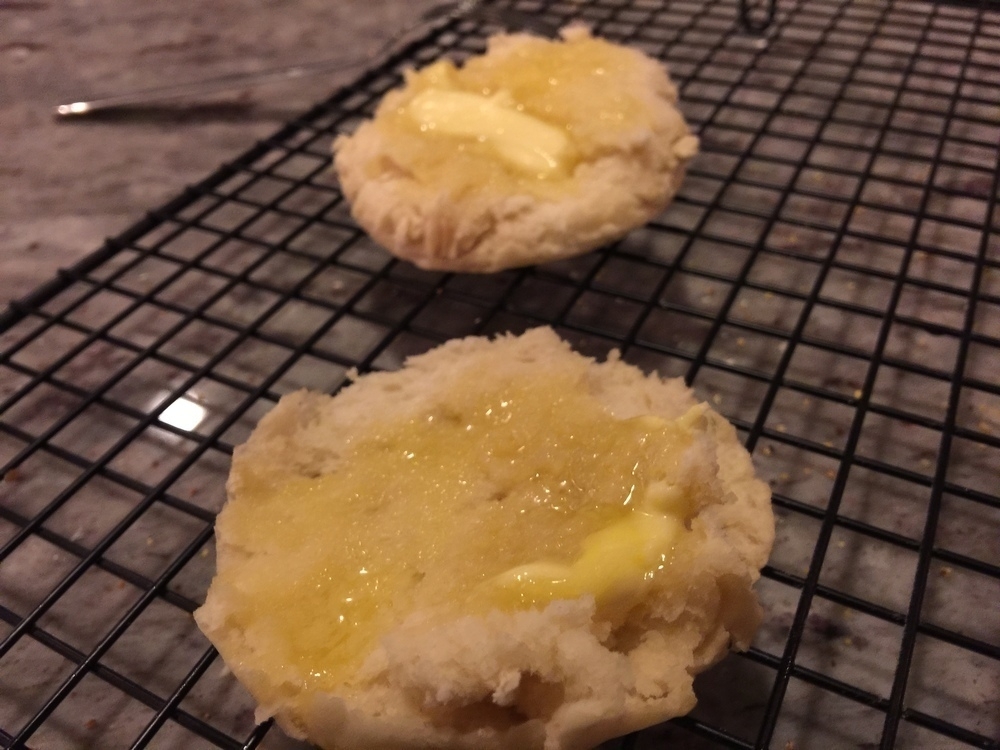
Yeild: 8 English muffins
Ingredients
- 1 cup 2% milk, room temp
- 2 tbsp. plus a pinch of white sugar
- ¼ oz (usually 1 packet) active dry yeast
- 1 cup warm (110-120ºF) water
- ¼ cup shortening, melted
- 6 cups bread flour
- 1 tsp. salt
- coarse-ground cornmeal
Tools
- Cookie Sheet
- Large mixing bowl
- Parchment paper or Silpat
- 8 Muffin or egg rings
- 12" cast iron skillet
Method
Warm your milk in the microwave up to 185ºF. In my microwave, this was about 90 seconds, but each one is different. Alternatively, you can do this in a small saucepan, but for this little milk I thought that was more trouble than it's worth.
Add 2 tbsp. of the sugar, and stir until dissolved.
Proof the yeast by adding it to the warm water (water needs to be no cooler than 110ºF and no warmer than 120ºF), stirring quickly, and adding a pinch of sugar. This gives the yeast a kick in the pants to wake up and get fermenting. Set aside for 10 min, until the yeast mixture gets nice and frothy.
At the same time, let your milk mixture cool to lukewarm.
Combine half the flour, salt, the milk mixture, yeast mixture, and the melted shortening in the bowl of your stand mixer, and mix until it just comes togehter. Add the remaining flour, and mix again, with the dough hook, until a loose dough forms.
Continue mixing the dough with the dough hook, to knead, for 2-3 min. Then move the dough ball to a large greased bowl, cover with plastic wrap, and set aside to rise. Let the dough rise for several hours, until it's slightly more than doubled.
Once it's risen, punch the dough down, and form a quick ball. Move the dough to a floured surface, and roll out to ½ inch thick.
Line a sheet pan with parchment paper or a Silpat, and lay out your rings. Sprinkle a little cornmeal into each one. This helps keep the dough from sticking to the lining.
Using, well, pretty much anything that's the circular and the same diameter or slightly smaller than the rings, cut circles out of the dough, and place them into the rings. Spray a little oil on the top of the dough in the rings, and sprinkle a little more cornmeal on top.
Cover with a tea towel, and let rise again for 30-50 minutes.
Heat your greased cast iron skillet to 380ºF, and carefully move as many muffins in their rings as will fit in the skillet. Cook for 7-10 minutes per side.
Remove to a cooling rack. Let the muffins cool for a few minutes, then remove from their rings (gently going around the inside of the ring with a knife, if you need to).
Store in a ziplock bag, and they'll last a week or so.
Why it Works
There isn't much about English muffins that doesn't work. A nice crisp exterior with a soft interior, just the right bit of chew, and that slightly-sour yeastiness makes for a way-better-than-store-bought muffin.
I've done Alton Brown's a couple times, and to me it's just more trouble than it's worth. Even though powdered milk is convenient in that it's shelf stable for ages, it's one more thing I have to buy. The dough is always too sticky, and sticks to the rings (using his tuna can rings, or the rings I linked above), and while short 30 min rise is great, and there are wonderful nooks and crannies, I like the depth of flavor in this recipe much better, thanks to the two rises. And if you go a little long on the rises in my recipe, you'll wind up with the same nooks and crannies.
I like to cook my muffins closer to seven minutes per side, leaving them a little underdone. Once I've split them and toasted them for my morning egg sandwich, they're absolutely perfect.
As an added bonus, you'll have some dough left over after you cut your muffins. If you roll this into a ball, form a loaf, put it into a greased loaf pan and cover for two hours; you'll be able to bake it at 425° for 40 minutes or so, and you'll have a great toasting loaf as well.
